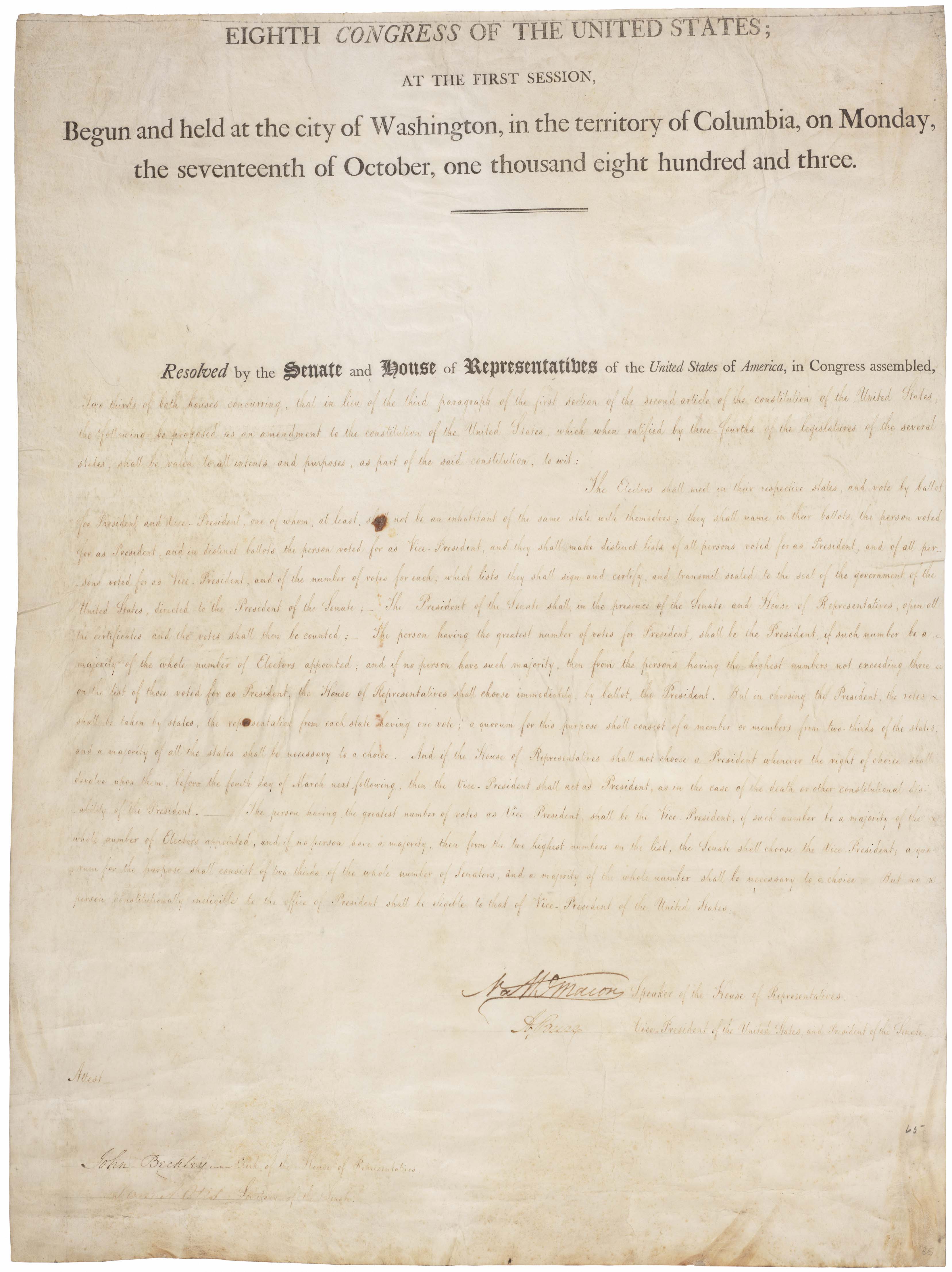The Electors shall meet in their respective states, and vote by ballot for President and Vice-President, one of whom, at least, shall not be an inhabitant of the same state with themselves; they shall name in their ballots the person voted for as President, and in distinct ballots the person voted for as Vice-President, and they shall make distinct lists of all persons voted for as President, and all persons voted for as Vice-President and of the number of votes for each, which lists they shall sign and certify, and transmit sealed to the seat of the government of the United States, directed to the President of the Senate.
The President of the Senate shall, in the presence of the Senate and House of Representatives, open all the certificates and the votes shall then be counted.
The person having the greatest Number of votes for President, shall be the President, if such number be a majority of the whole number of Electors appointed; and if no person have such majority, then from the persons having the highest numbers not exceeding three on the list of those voted for as President, the House of Representatives shall choose immediately, by ballot, the President. But in choosing the President, the votes shall be taken by states, the representation from each state having one vote; a quorum for this purpose shall consist of a member or members from two-thirds of the states, and a majority of all the states shall be necessary to a choice. And if the House of Representatives shall not choose a President whenever the right of choice shall devolve upon them, before the fourth day of March next following, then the Vice-President shall act as President, as in the case of the death or other constitutional disability of the President.
The person having the greatest number of votes as Vice-President, shall be the Vice-President, if such number be a majority of the whole number of Electors appointed, and if no person have a majority, then from the two highest numbers on the list, the Senate shall choose the Vice-President; a quorum for the purpose shall consist of two-thirds of the whole number of Senators, and a majority of the whole number shall be necessary to a choice. But no person constitutionally ineligible to the office of President shall be eligible to that of Vice-President of the United States.
That may seem like jibberish, but you might want to learn what it means … and here’s why.
Libertarian Presidential Candidate Bob Barr is fighting to have both Barack Obama and John McCain stricken from the ballot in Texas.
Basically, the state of Texas has a law that the nominees for president must file with the state by August 26th. Thing about it is, neither Barack Obama nor John McCain did that … in part because neither was officially nominated by their party by that time.
This may seem trivial, but could be a big deal. I’ve read story after story about minor party candidates being stricken from ballots in dozens of states due to electoral glitches or archaic rules. And those minor party candidates have challenged the rules and lost in court. States are allowed to decide their own rules for elections. End of story.
So will Texas make an exception? Or will McCain and Obama be removed from the ballot there?
If that happens, John McCain will be missing out of 34 electoral votes that I’m sure he was counting on. And frankly, it’s hard to imagine him getting to 270 without those votes. But that doesn’t mean Obama will necessarily win either.
Essentially, if it’s a close election that McCain should have won, neither candidate will get the 270 required to win the presidency outright.
And if that happens … that’s where the 12th Amendment comes in.
The House of Representatives would be charged with choosing the president. But not the entire House. Each state will choose one member of the House from that state to cast their vote, choosing from any candidate who received at least one electoral vote.
Of course, each state will choose a member from the majority party WITHIN THAT STATE, which would actually give John McCain a slight edge … under the current makeup of Congress (although it would be decided by the new Congress, so that could shift).
Making matters more interesting, the Senate would pick the Vice President … with each Senator casting a vote. The Senate’s current makeup leans to the Democrats, so Biden would have the edge.
Who says politics isn’t interesting …



good looks scott, way to do your homework. i dont mind bob barr, but i hope for McCains sake that they do not throw out Texas. Thats the equivalent of throwing out New York for Obama. Scott, could you tell me why, if you’re a republican you should even bother voting in New York for president?
That’s a pretty good question. Rules are made for a reason. I for one hope they uphold this law. I can’t wait for the television coverage if this actually works out.